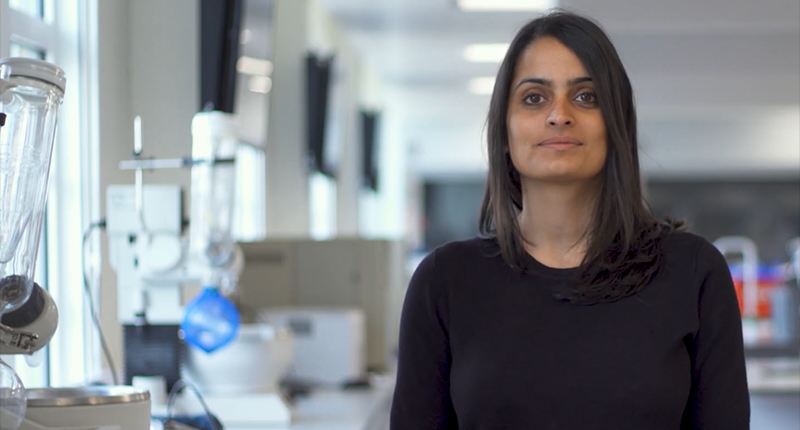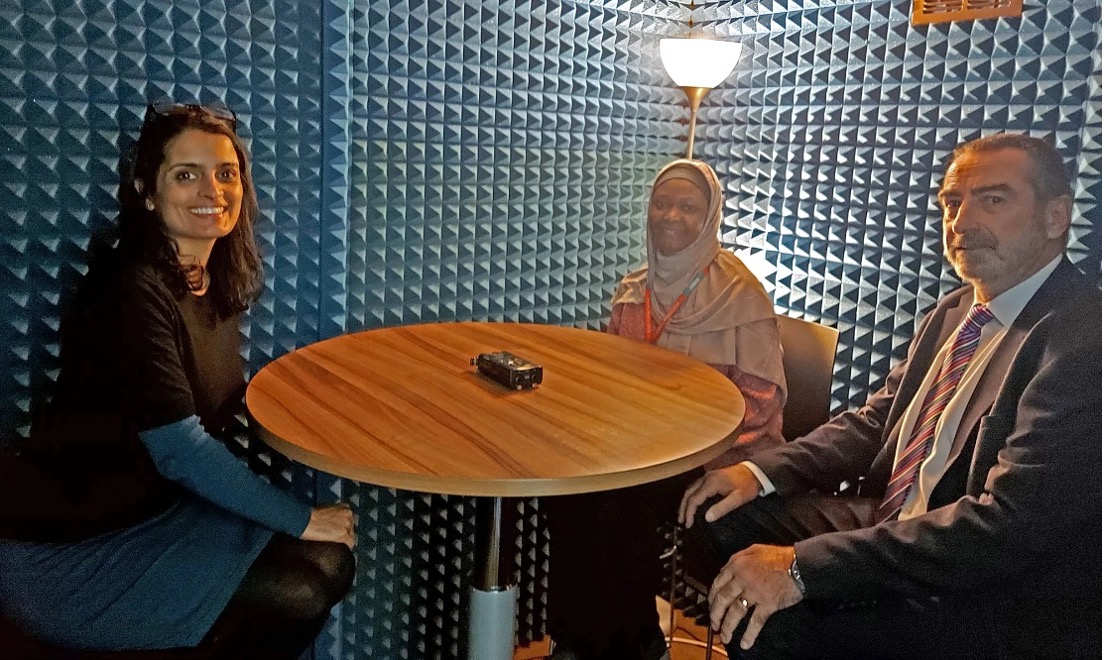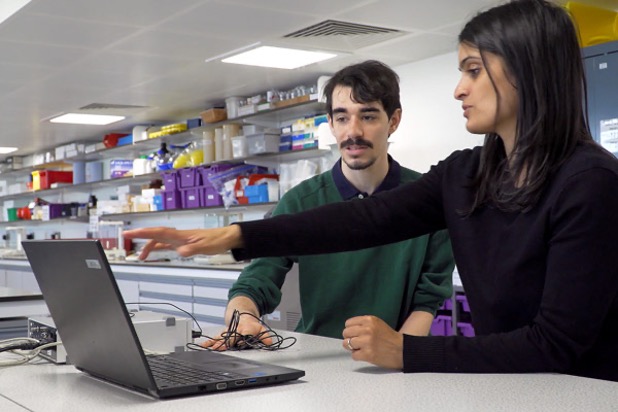Everything is an Opportunity: A science communication interview with Professor Manasi Nandi
Written by Amanda Bowman, PhD Candidate at King’s College of London
In the constantly evolving landscape of online communication, I had the privilege of interviewing Professor Manasi Nandi, a pharmacologist and data scientist in the Department of Pharmaceutical Science at King’s College London (KCL). Manasi has committed herself to supporting scientific research and communication through academic publications and outreach events. In Manasi’s podcast, “Humanising Healthcare”, she uses a people-centered approach to research to understand health inequalities within different fields.
The following is an interview I conducted detailing Manasi’s academic and research journey, her introduction to science communication, and the challenges and rewards she sees within that realm.

Professor Manasi Nandi of the Department of Pharmaceutical Science at KCL.
Academic and research journey
To start us off, could you describe your current research focus or projects within your field?
I am a pharmacologist in the Institute of Pharmaceutical Science within the Faculty of Life Sciences and Medicine. Rather than a pharmacist, who has a patient-facing role, a pharmacologist focuses more on drug development and evaluation. I was previously a drug discovery and development scientist for both academic and industry projects, specifically at the preclinical validation step, providing evidence as to whether a drug was ready to be moved onto human trials. In these projects, I developed and used animal models to test drug efficacy for several areas of research, from preterm labor and neonatal lung conditions to cardiovascular system disorders.
These studies gradually led to my research focus transitioning towards data science, using results from vital signs waveforms such as ECGs and blood pressure. I’ve made a move from a wet lab into dry lab, but one which integrates my pharmacology knowledge.
How did you get into the field of academia? Is this the trajectory you saw for yourself when you were beginning your career journey?
During school, I was interested in healthcare and medicine. I ended up studying pharmacology because the admissions tutors at my university were passionate about their subject and dedicated to the care of their students.
Sometimes people assume being a professor means you are a man with a beard sitting in a leather chair, surrounded by books and navel-gazing. Now I know it absolutely isn’t that, but when I was 18, that misconception meant I didn’t even consider being a professor in academia as a career goal.
However, during my undergraduate industry placement, I saw what being a scientist was. I was pushed to be a good communicator, working with different types of people, and I was challenged to take on more responsibility. I had planned to apply for jobs in the pharmaceutical industry. Then, in my final year, I saw a lecture by a clinician scientist showcasing the research from his lab. Their work told the story of a specific biomarker in cardiovascular disease, and they described how they studied it all the way from the bench to bedside. The way that they were able to tell this story in one concise lecture blew my mind! I inquired about work experience in their lab, and they suggested applying for a PhD position.
I was successful and started working in an environment embedded in a hospital, working with doctors and scientists. That’s where I realized what working in academia was all about and led me to take on post-docs at University College London and later a junior lecturer position at King’s College London. I continued doing my wet lab research and set up undergraduate teaching modules about medicine development. Eventually, my research led to me entering data science.
So, the answer is this was never the trajectory I saw for myself at the beginning, but I am delighted that I am here now. One thing it has taught me is just because you do something at a certain age doesn’t mean you have to do that same thing forever. Everything is an opportunity; learn, question, network, see yourself in other people - doors will open and some of those will be the right fit for you.
Science communication
How did the idea of starting a podcast come about?
When I applied for a leadership role as an Equity Diversity Inclusion (EDI) lead within my school, I proposed that we should embed more about the social determinants of health and social justice principles, putting them in the scientific framework of medicines development and disease research. This idea was motivated by all the social injustices I saw happening across the world, which motivated me to be more proactive. In the biosciences, there is a general lack of focus on social justice and social determinants of disease, and this can affect the full impact of our research. I started off by creating a seminar series with the aim of reaching an academic audience beyond those people who usually attend EDI talks. I embedded EDI research into a more general scientific seminar. This got the attention of the Faculty of Life Sciences and Medicine People and Culture team, who supported the seminar series being turned into the podcast it is today. I frequently listen to podcasts and radio – it’s an easy way to engage with the world without too much effort. You can listen whilst you’re doing the washing up!

(Left to right) Professor Nandi, Fatima Auwal, and Professor Graham McClelland, discussing milestones reached in diversity within medicine development.
Challenges and rewards
What are some of the challenges you face when communicating scientific concepts to a broader audience?
Language is so important. You don’t want to patronize or overwhelm your audience. The challenge with a podcast is you don’t know exactly who your audience is or their background knowledge. I usually repeat and define technical terms during recording for further context.
It helps that we have support from the comms team who don’t have a bioscience background – they’ll give us a nudge when we’ve used a word that is technical.
What do you find most rewarding about engaging with the public through your science communication efforts?
It’s rewarding to see that penny-drop moment where showcasing an example of a social injustice triggers them to see how they can do something in their own fields. We’ve had positive feedback from students to doctors and those who work in policy or align with the NHS. That’s a really rewarding part of the podcast itself.
Beyond the podcast, I’ve also had the pleasure and privilege to present my research at the London Science Museum and Science Gallery London and just seeing how the public both respond to and recognize the passion our research group has about what we do! Academia is a critical field and can knock you down at times, whereas in the public eye, people are excited and inspired by scientists who are passionate and greatly value this. Presenting our research and engaging with school-age children is especially rewarding, and sometimes their questions really get you to think. Being able to open peoples’ eyes and get them excited, showing them a different perspective to science can impact their career decisions. One thing leads to another - these small encounters can have a longer lasting impact.

Impact and future directions
How do you envision the future of science communication, particularly in the field of pharmacology and data sciences?
The pandemic really showed the importance of clear science communication, especially when concerning public health. In the case of pharmacology and pharmacy, there have been a lot of articles about cancer biologics and formulations that can be targeted within the body. It is getting to almost sci-fi levels now to what these medicines can do! Getting the public to understand that it’s not scary sci-fi but actual reality that they shouldn’t fear, can only come through good communication and improving health and science literacy.
How do you see science communication impacting diversity and/or accessibility in science?
I feel we are doing a better job at developing science communication skills now compared to a decade ago. It’s more common to see experts of diverse backgrounds communicate well and who are viewed as science leaders. This extends beyond tokenism and can have wider positive impacts on those early in their careers.
Journals have the opportunity to showcase diverse researchers. I’d like to see more interviews/blogs showcasing the PhD student or junior fellow who is a first author on a paper. Showcasing the junior crowd who did the day-to-day work might help to encourage school students and young scientists and expose them to the range of people working in academia.
A big thank you to Professor Nandi for meeting with me. It was wonderful to chat with her, and I am excited to share her story and tips regarding science communication to our readers!

A link to Professor Nandi’s podcast ‘Humanising Healthcare.’
Related Content
5 creative ways to stay productive in graduate school
How to create a LinkedIn profile for scientists
How to transition from academia to industry using LinkedIn
8 Tips for Networking at Scientific Conferences
Support
Newsletter Signup
Stay up-to-date with our latest news and events. New to Proteintech? Get 10% off your first order when you sign up.

